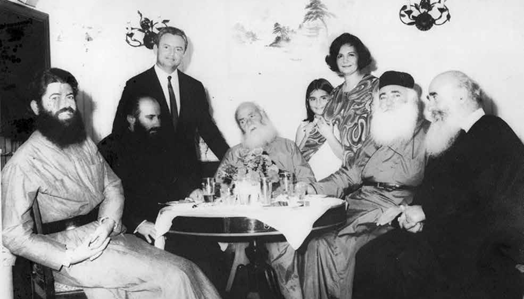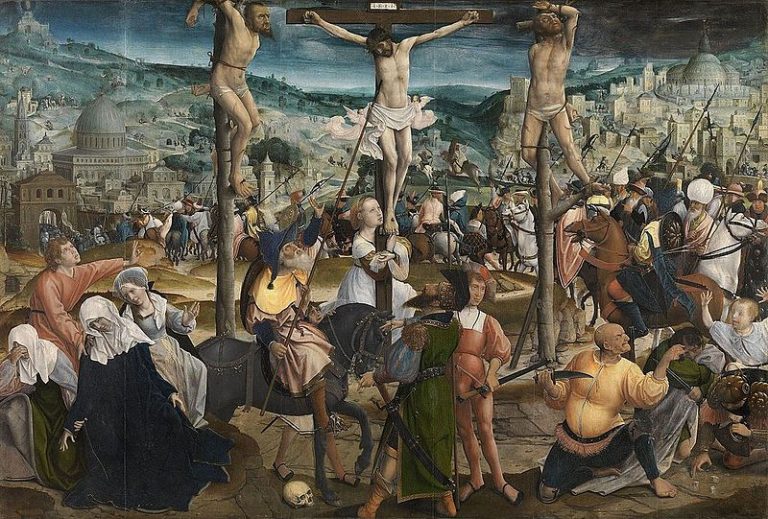Apostle Matthew: Missionary lesson from Jesus
The incident of the call of the publican Matthew (or Levi, son of Alphaeus of Galilee) to the apostolic office and thus to the missionary way of life is mentioned by all three synoptic writers – Matthew, Mark and Luke – with very few differences. Their comprehensive narrative, though brief, reveals almost the entire life of the evangelist.
“And after these things he went out, and saw a publican named Levi sitting on the publican, and said unto him, Follow me: and a great multitude of people followed him: and there was a great feast of Levi in his house, and a multitude of publicans and others that were with them.And their scribes and the Pharisees cried unto his disciples, saying, Why do ye eat and drink after the publicans and sinners? and Jesus answered and said unto them, Not the wholesome have mercy, but they that have done evil: call not the righteous, but sinners to repentance. 5:27-32).
The Lord, after healing Capernaum’s paralytic, “went out and saw a publican named Levi sitting on the tax”. He met a publican and stared at him with His divine yet fatherly gaze. He was a sinful child of His whom the world had rejected, shunned to look upon him, to speak to him, to associate with him. Perhaps not without reason. But in this treatment He was also failing to correct him, abandoning him to his passions – and more specifically to greed, covetousness and inhuman injustice. But the Cardinal, Love incarnate, has a way. She does not ignore the person, she sympathizes with and accepts all the images of God and thus calls them to turn away from sin and live in repentance. The apostle Paul wonderfully brings out the “kenosis” that a representative of God must display in order to lead souls to salvation: “To anomos as an anomos, not as an anomos Θεω, but as an anomos to Christ, that I may win anomos” (1 Cor. 9:21), and “I have forgiven all things, that I may save all men” (1 Cor. 9:22). How will you save a man if you do not look at him, if you do not hurt him, if you do not take his place in everything but sin? Thus, through the love of Christ, Matthew’s conversion was miraculously accomplished. He was a tax collector, that is, responsible for collecting taxes from the citizens. At that time, practicing this profession meant a constant “chasing” of money, since the tax collectors would willingly “overpay” the set taxes for their own benefit. In order to meet the demands of this job, however, it was necessary to know the circular letters. Consequently, this basic education was also possessed by Matthew. Entering, therefore, the group of twelve, he was the most educated member of the group. That is why God, after enriching him with the illumination of the Holy Spirit, entrusted him with the writing of His Gospel [1] Stergios Sakkos, “Interpretation of the Gospel of Luke”, ed.
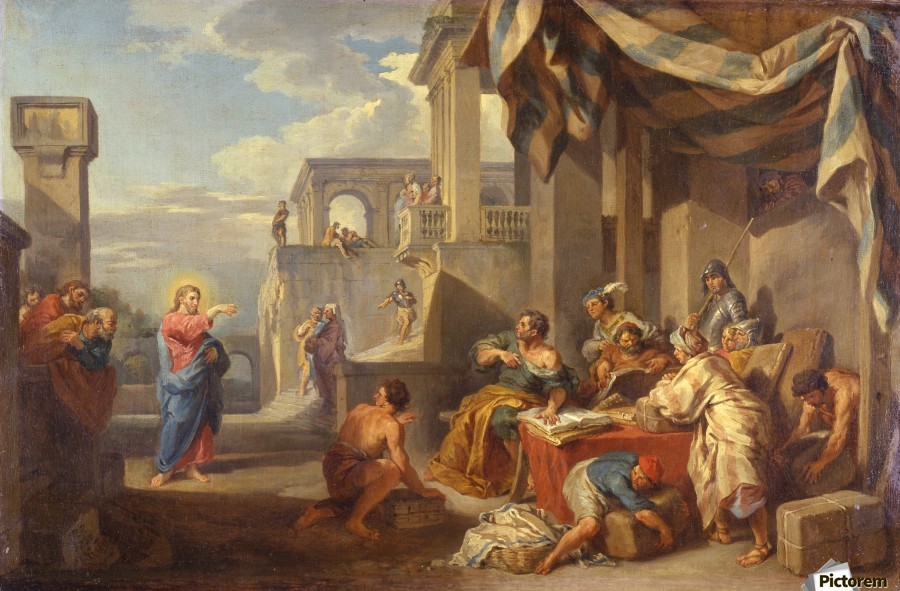
What time is the call attempted?
In this passage Jesus teaches about mission. He chose to speak to the publican immediately after the sign of Capernaum, and not at the same time or shortly after the call of the “fishermen” disciples, whom he had also attracted by miraculous event. As St. Chrysostom points out, “he did not call Matthew at first, but after he had performed a multitude of miracles and when the fame around his name had greatly increased, when he knew that he would more readily obey the invitation because of this experience.” [2]John Chrysostom, Sermon L, H.P.E., ed. “Gregory Palamas”, vol.10, Thessaloniki 1990, p.299.. Following the example of the great Master, we too, in our missionary ministry today, must first perform the “miracle” of charity, present the model of Christian life -where it exists- and then call people closer to God.
What is the best place to call a man?
Wherever people are, even in the most disreputable places. The Lord called Matthew when He saw him “sitting on the perfection.” This detail is noted by the Evangelist Luke to emphasize – as St. Chrysostom interprets it – “the power of him who called him, that is, that although Matthew had not finished, nor had he turned away from this evil holding, Jesus drew him out of these very evils, just as he did the blessed Paul, who changed the course of his life the moment he had set his fury and rage in motion and was hurling fire against the Christians.” [3]John Chrysostom, Sermon L, H.P.E., ed. “Gregory Palamas”, vol.10, Thessaloniki 1990, p. 301..
Can all people receive God’s call and repent?
Yes, glory be to God the Father, who allows all men, whatever profession they follow, whatever “crooked” path they walk, whatever sin they commit, however great and repulsive it may be, to be able to accept the call, provided they have not put up a barrier! Our Holy Scriptures and the synaxies of the Church are full of penances of saints: David, Peter, Mary the Egyptian… All of them shout that God saves His children as long as they want to… Continuing the interpretation of the passage, the same father comments on Matthew’s profession in comparison with that of the fishermen disciples: “But their profession-that is, the fishermen’s-was a kind of art, not a disreputable one, of course, but a profession of men who lived in their own village but were pure and had a great deal of naivety, whereas the publican’s was a profession full of shamelessness and insolence, without any reasonable excuse for all that they did, and was a trade full of insolence as well as theft covered externally by the law. Yet He who called him felt no shame for any of these things.” And at this point he asks : “And why am I surprised that he felt no shame – Jesus – in inviting the publican as his disciple, and at no time certainly not even for one prostitute did he not only feel shame in inviting her, but also gave her the right both to kiss his feet and to sprinkle them with her tears? Since this is certainly why he came into the world, not only to heal bodies, but also to free the soul from evil” [4] John Chrysostom, Sermon L, H.P.E., ed. “Gregory Palamas”, vol. 10, Thessaloniki 1990, pp. 302-303. The typical case of the healing of the paralytic makes clear the intention of all Jesus’ actions.
“And when he saw their faith, he said unto him, Man, thy sins be forgiven thee.And the scribes and the Pharisees began to reason, saying, What is this that speaketh blasphemy; what can God alone condemn sins, if not God alone? and when Jesus perceived their meditations, he answered them, saying, What meditate ye in your hearts? What is more convenient, say, let your sins be forgiven you, or say, arise and walk? and when you see that the Son of man hath power on earth over the sins of the sinner, he saith unto the paralytic, I say unto you, arise, and let your bed go to your house.And sigh before them” (Luke 5:20-25).
In this way He has shown that He has the ability to forgive sins, which allows repentant sinners to be counted among “His own”. Therefore, people should not be surprised to see the publican in the group of disciples. So far we have studied Jesus’ missionary activity, addressing the Levi tax collector. Let us also look at the excellent effects it had on Matthew’s heart, soul, and being. “And he said unto him, Follow me. And he followed him with a great sigh.” To Jesus’ invitation Matthew responded in hopelessness. He knew very well and from the case of the other disciples that this subversive “follow me” meant that he must cut himself off from the money that was his main purpose in life. He ought to despise the abundant material possessions that provided him, to abandon his family and deny himself, that is, to take up his cross and then follow him (Matt. 16:24). And yet he had the courage, spiritual maturity and deep humility to do so; “καταλιπων απαντα αναστας ηκολούθησεν αυτω”; prompting St. Chrysostom to emphasize: “But he immediately accepted the invitation and did not ask to go to his home and announce it to his relatives, just as the fishermen did this, but in the same way that they abandoned their nets and their ship and their father, in the same way that he , having abandoned the custom house and the profit derived from it, He followed Him, proving that his disposition was prepared for everything in general, and having at once removed himself from all the cares of life, he confirmed by his full obedience the call of Jesus in due time.” [5]John Chrysostom, Homily L, E.L, “Gregory Palamas”, vol. 10, Thessaloniki 1990, p. 303.
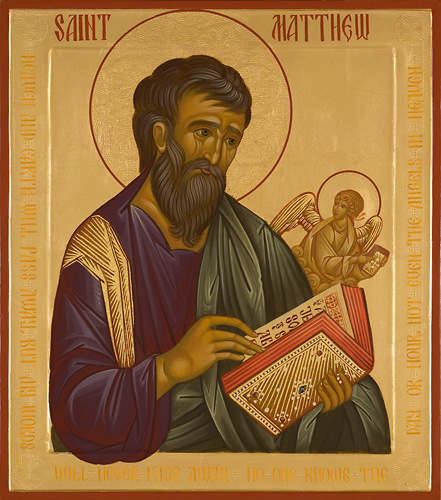
What is admirable is not only the publican’s brave, immediate response to Jesus’ invitation, but also his missionary disposition immediately after his inclusion in the group of disciples. This fact – for the scrutiny of all of us so-called Christians – proves, firstly, that he was not ashamed of his decision to change his life and, secondly, that his repentance was genuine and complete, giving him an excellent experience, since without wasting time he invited other tax collectors to attempt to experience what he was experiencing. Like Philip’s “come and see” (Jn 1:47) to Nathanael, Matthew “had a great glory” “in his house, and there was a multitude of publicans and others who were with them.” And he did this because he was proud of his choice and knew full well that Jesus could heal his other tax collector friends. “The new disciple wants his friends to know Jesus, the banquet was a way to meet with him. This was Matthew’s first missionary act” [6] [6] Stergios Sakkos, Interpretation of the Gospel of Luke, Christian Elpis, vol. 1, Thessaloniki 2008, p. 234. Reflecting on Matthew’s supper, John Chrysostom orients the missionary man to the standard he ought to have and the way in which he ought to move: “Although, of course, the things laid at the table came from injustice and greed, nevertheless Christ did not refuse to participate in it, because great benefit would result from it, and for this reason he came to this house and sat at the same table with those who had committed this kind of injustice. Such must be the doctor because if he is not able to tolerate the filthiness of the sick, he cannot relieve them of their illness” [7] [7] John Chrysostom, Homily L, H.P.E., ed, Thessaloniki 1990, p. 307. The imitator of Christ is very likely to be criticized by people who are possessed of the same spirit as the scribes and Pharisees. They, on the one hand, would groan and grumble at the disciples, asking and questioning hypocritically and at the same time controllingly, “Why do you eat and drink after the tax collectors and sinners?” And the Lord, on the other hand, gave and will always give the same paternal answer: “not the healthy have need of a physician, but the wicked; I will not call the righteous, but sinners to repentance.” St. John Chrysostom does not fail to interpret the wonderful content of the above divine words. For they on the one hand consider it a crime to associate with men of this kind, while on the contrary he says, that not to associate with them is something which is not befitting of him and his charity, and not only is it not a crime to correct men of this kind, but it is also something which is of primary importance, which it is necessary to do, and which is worthy of much praise” [8]St. John Chrysostom, Homily L, H.P.E., “Gregory Palamas”, vol. 10, Thessaloniki 1990, p. 311.
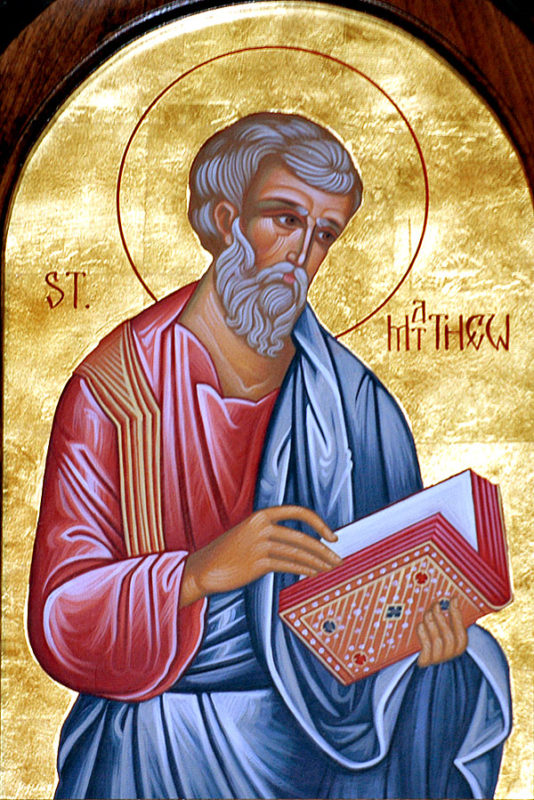
Matthew, after the Ascension of Jesus, preached the joyful message of the Resurrection of Christ and the salvation of the world to the circumcised Christians of Palestine [9]Stergios Sakkos, Interpretation of the Gospel of Luke, ed, Thessaloniki 2008, p. 234., wrote the Gospel of Matthew and – according to tradition – preached to Parthians and Medes. Finally, he completed his apostolic activity martyrically, being put to death by the trial by fire. In fact, according to St. Nicodemus the Athonite and his life in the Eclogue, he evangelized the Parthians after his martyrdom, since in their hands his relic performed a miracle with the ultimate result that their king was baptized, renamed Matthew and ordained bishop, leaving the throne to his son [10]Nicodemus the Athonite, Synaxaristis, ed.”Orthodox Hive”, vol. 2, Thessaloniki 2003, pp. 119-121. The memory of the Apostle Matthew is commemorated on 16 November each year.
Sound c’. Divine Faith. I receive the light of divine hearing, the voice of the Word, and of faith, having left the bond of customs, whereof Christ’s unsecreated embroidery, I proclaim, O Matthean Apostle. And now, O thou ambassador, let them that are in thee be given thee, in mercy and great mercy.

